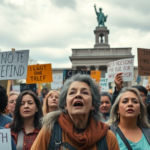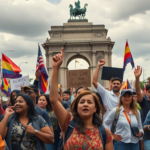OpenAI Employees Frustrated Over Equity Donation Restrictions Amidst Valuation Surge
The skyrocketing valuation of OpenAI has thrust many of its employees into the realm of paper millionaires, yet an increasingly vocal group within the company faces obstacles when attempting to donate portions of their equity to charity. Despite internal efforts to address this, the company prioritizes its transformation into a for-profit entity over facilitating charitable contributions, leaving employees frustrated and charity-focused strategies unutilized.
Understanding OpenAI’s Unique Structure
Originally founded as a nonprofit research lab in 2015, OpenAI operates with a nonprofit parent organization and a controversial equity structure. Instead of traditional shares, employees receive profit participation units (PPUs), which require company approval before any transfers can take place. This unusual structure, rooted in its nonprofit origins, complicates the process for employees looking to donate equity to charity.
Recently, OpenAI’s valuation reached a staggering $300 billion after a $40 billion funding round led by SoftBank, converting many in the company into potential philanthropists with equity holdings worth millions on paper. However, the constraints imposed by their PPUs make direct donations challenging, leading to mounting discontent among employees eager to contribute charitably.
Internal and Financial Priorities
Despite calls for reforms, OpenAI executives maintain that any changes to facilitate equity donations must wait until significant financial events conclude. However, these events face indefinite postponement, pushing potential donation opportunities further into an uncertain future.
In an internal meeting, CFO Sarah Friar highlighted the company’s current focus on finalizing its funding round and solidifying its transition to a for-profit business model. Friar indicated that charitable donation solutions could follow but did not commit to a formal timeline, causing further frustration among employees.
Potential Solutions and Expert Opinions
One solution endorsed by numerous financial experts is the utilization of donor-advised funds (DAFs). These funds allow employees to bypass capital gains taxes, effectively increasing the value of donations by up to 40%. Christina Kramlich, co-founder of Cantata Wealth and a Bay Area advocate for DAFs, emphasized their tax efficiency. “DAFs are an incredibly winning strategy, allowing employees to support their chosen charities effectively without facing excessive tax penalties,” she explained.
OpenAI has acknowledged DAFs’ potential benefits and confirmed partnering with Dechomai, a donor-advised fund. However, the tangible implementation of this strategy remains stalled amidst the company’s broader priorities.
Charitable Implications and Community Impact
The situation not only underscores the complexities surrounding OpenAI’s corporate structure but also highlights broader challenges tech startups face in balancing financial growth, governance, and benevolent initiatives. For the local community, the delays in facilitating equity donations mean reduced potential contributions to nonprofits and community programs.
Brownsville native and philanthropic advocate Maria Torres expressed disappointment over the delay in charitable advancements. “Our community greatly benefits from tech-driven philanthropy. OpenAI’s hesitance in promoting charitable giving affects prospective local initiatives,” Torres stated.
Connections to Broader Trends and Future Implications
OpenAI’s stance illustrates a wider issue within rapidly valorizing tech firms, where striking a balance between financial restructuring and employee-driven philanthropy poses a continual challenge. As other tech companies observe OpenAI’s trajectory, the implications resonate across the sector, influencing future policies around employee equity and contributions.
A potential restructuring into a public benefit corporation may simplify donation procedures in the future, as indicated by recent announcements. However, the strategy’s exact impact on the ability of employees to engage in philanthropy remains uncertain, contingent on corporate priorities and broader governance decisions.
Perspectives on Corporate Control vs. Philanthropy
While some laud OpenAI’s careful governance and cap table management as prudent business practices, critics argue this control comes at the expense of employee autonomy in charitable endeavours. OpenAI’s spokesperson reaffirms the necessity of stringent equity controls to align with corporate governance policies and maintain orderly shareholder records.
However, employees seeking to contribute to causes they care about see this as a limitation on their economic freedom. As internal discussions reveal growing employee pushback, the company faces pressure to find a middle ground that satisfies both its business objectives and philanthropic aspirations.
Conclusion
OpenAI’s situation reflects a significant case study in the convergence of tech innovation, corporate strategy, and philanthropy. While eager employees await opportunities to leverage their newfound wealth for charitable causes, OpenAI must navigate its complex corporate transformation. The outcome remains closely watched, both within the tech community and by the philanthropic entities it ultimately aims to support.
For residents interested in joining the conversation or voicing concerns, OpenAI has planned forums and discussion panels in Palo Alto. Those affected by these developments and keen on understanding their rights and options are encouraged to engage with these platforms to shape the dialogue around tech-driven philanthropy and corporate stewardship in the 21st century.







